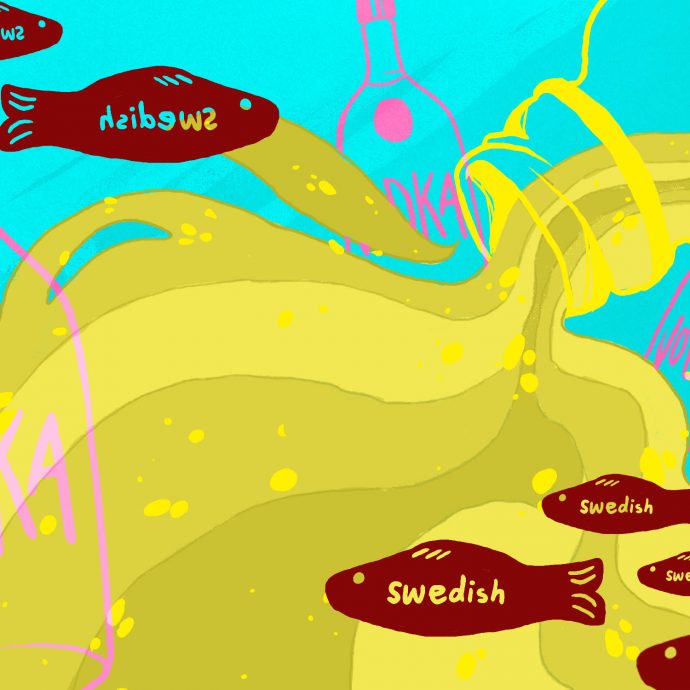Wednesday morning I walk into Beyond the Box, a little bodega/cafe in downtown Dallas, on Pacific Ave, and announce that I’M HERE FOR THE KOMBUCHA. The owner, a stalky Mexican man with a eunuch-high voice, points to the Coca Cola cooler against the back wall. I walk over and stare through the glass. I consider the flavors. The flavors have fancy names like Green Guru and Corazón and Moondance. I pick Moondance. It’s yellow. A thick layer of bacteria has settled on the bottom. That’s what I’m after. The bacteria. Kombucha is PROBIOTIC. According to the label: ALIVE. I’ve heard that if you drink it every day it will solve certain problems for you. I don’t know which ones. I haven’t done my research. I don’t like doing research. I believe that not doing research is one of the things that has held me back in life. My wife, J, does research. She publishes articles in peer-reviewed journals. I haven’t read them but I’ve seen her list of sources. Pages and pages in perfect MLA.
The night before I woke up at 3am. I walked into the bathroom and threw up a gut-full of blood. That’s it, I thought. The vodka portion of my life is now officially over. I crawled back into bed and shook myself to sleep. The next morning I remembered the half bag of Swedish Fish I’d eaten before bed. That explained why the “blood” was neon red and highly gelatinous. Jello in the veins. Still though. I knew certain things in my life needed to change. On the DART into downtown the next morning a word appeared in my mind’s eye. I didn’t so much think it or hear it. I read it. And the word I read was: PROBIOTIC.
“Kombucha,” the owner said when I set the bottle of Moondance on the counter. And then he said it again. “KomBUCHa.” He looked at me and I looked at him and I understood that there are very few joys in this long, stupid life, and that, when you say it out loud, kombucha is a pretty funny word.
“Kombucha,” I said. “KomBUCHa.”
He nodded and hummed like we were two jazz musicians trading bars.
I spent all of 2015 listening to Thelonious Monk. Then I read a book about him. It was called Thelonious Monk. That’s how I learned he was crazy. Some people say you can hear the craziness in his music. I’m not so sure. What I hear is someone working things out. On my favorite album of his, Monk’s Dream, he plays the same songs over and over again, like he’s saying, How about this way? Or Maybe a little more like this? The first song is called “Monk’s Dream Take 8.” I picture him in the studio with Frankie, Charlie and John saying, “Again, again, again, again, again, again, again, again.”
You work things out. You do your best. You try not to Monk it up too bad. Otherwise, you just sort of walk around. I saw a tweet recently. It said: “How to write an existential novel. 1) 30-something white guy thinks he’s first person in history to be depressed. 2) No plot. 3) The end.” I thought: So that’s how you do it. I got to work right away. People are always discouraging each other from writing existential novels. I don’t know why. Speedboat is my favorite book. “Don’t you worry about naval gazing?” an interviewer asked Renata Adler, the writer of Speedboat, who was much more famous at the time for her ruthless literary criticism than her unknown existential navel (sorry: novel.) And Adler said, “Why would I worry about that? I love my naval. It’s my best feature.” Then she lifted up her shirt. When I read that, I remembered something. Before we were having sex, my girlfriend (who is now my wife) used to finger my bellybutton. We were both pleasantly surprised to find that she could fit her entire arm inside of it, all the way up to her elbow.
I don’t know anybody who doesn’t believe in inoculations but if I did I could see where they were coming from. It took us a long time to figure out that a little bit of something bad for you is actually something good for you. It doesn’t make sense. We just have to trust them on this one and chug the kombucha like they say we should. We’ll get used to it. We’ll get used to anything. For a while I was eating a buffalo chicken wrap every day. I got it from Murphy’s Deli on Harwood Ave. How I remember the name of Murphy’s Deli is by thinking of Murphy’s Law, which says that all the bad things you worry might happen will happen, so stop worrying, dummy. It took me a few weeks to realize that the wrap tasted exactly like vomit. But by then I’d gotten used to the taste and kept eating it anyway, two or three times a week. “And that,” I explained to my coworkers at lunch on Friday, just before giving my two weeks notice, “Is how I acquired a taste for vomit.”
You can acquire a taste for anything. So be careful what you acquire a taste for.
Thelonious Monk acquired a taste for semitones. Dissonance. In jazz, they call it “bite.” Monk had a taste for bite and a sweet tooth like you wouldn’t believe. Did the bite drive him crazy or did craziness drive him to the bite? On my second favorite album of his, Thelonious Alone in San Francisco, it’s just Monk and the keys. No Frankie. No Charlie. No John. If you listen close you can hear Monk mumbling along with his own melodies, some secret language between him and his piano that doesn’t/couldn’t/couldn’t-possibly make sense to anyone else.
As part of my new PROBIOTIC LIFESTYLE I begin each day with a cup of Peaches on the Bottom Greek Yogurt and one self-affirming thought, like: What’s cookin’, good lookin’! Or: Give em’ the old razzle dazzle! On Monday morning my dad gets fired from his job at the antenna factory. He’d been in the business of sending and receiving signals. I call him that night with a cup of vodka in my hand and one already in my stomach. He tells me that antennas just aren’t what they used to be. They’ve changed, man. Gone all corporate. I ask him what he wants to do now. He says something more down to earth. Like cables or cords. He says he knows a guy who works in wires.
“Don’t worry,” he tells me. “I won’t freak out this time.” He freaked out last time, etc, ancient history, except that sometimes I worry we’re all (his progeny) rigged to blow. Some malware hidden in the DNA source code. Some of us are taking Prozac preventatively. Some of us are turning to more holistic coping methods e.g. JOGGING e.g. SAINT JOHNS WORT e.g. TRYING OUR BEST NOT TO GODDAMN THINK ABOUT IT.
After I hang up with my dad, I put on Solo Monk and lay back on my couch and stare at the mold that’s growing on the ceiling. A black web in the shape of a lung. I finish the vodka and pour another. I think about J, who’s at UNT doing her research on educational psychology, writing her academically-sound papers, checking then re-checking her peer-reviewed sources, getting everything exactly right. It’s important to keep active, I think, sinking into the cushions. The worst thing you can do is stay still. I’m sleeping by the time J gets home and J’s sleeping by the time I wake up, a little past 1 a.m., Monk still looping in my wireless headphones.
It’s a well-known fact that babies born C-section suffer moderate-to-severe digestive issues later in life due to not being push-fed through that teeming probiotic cooter-chute known in the medical community as the VAGINAL CANAL. They come out squeaky clean and bacteria free. Vulnerable to the slightest imperfections. K, a C-section baby, tells me she’s considering a fecal transplant, an experimental procedure with a promising success rate. She’s on the look-out for a shit donor. I tell her I haven’t had a solid bowel movement in two years, but I’ll let her know if I hear of anything. I wasn’t born C-section but I was hermetically sealed until the age of twenty-one. That year I chugged a Blue Moon and watched a woman take off her clothes. Too little too late. I’m still recovering from my aseptic adolescence. Building up an immune system I can be proud of. Licking the forehead of every homeless person I can find who’s willing and who wants to make a quick buck.
Little disappointments. Undisclosed failures. Harmless acts of self-sabotage. Fleeting, hateful thoughts about the people we love. Tell me: How do you keep yourself inoculated? When the time comes, will you be immune from whatever it is that you’re susceptible to? (Don’t pretend you don’t know what it is.)
Recently scientists spread mold spores over a map of India, on top of the slums. 24 hours later the mold had slid its rotten tendrils along the exact path of India’s roadway system. It took city planners decades to figure out the most efficient routes through the city. Mold did it in a day, and without a brain. “What can we learn from this?” the city planners asked, still thinking that learning things had anything to do with the point. The city planners were fired that afternoon and replaced with a chunk of fungus the size of a newborn brain.
“IF MOONDANCE IS FOR ME WHO CAN BE AGAINST ME?” I yell from the couch after J opens our refrigerator and there’s nothing in there but Moondance kombucha. The bottles glow. A holy yellow. The sunburst color of the Piss Christ. Unique bacterial formations spawn inside every bottle, tall and slender as the double helix. You can read your fortune in them. “EACH ONE IS SPECIAL.” I’m drunk again. My mouth is blood-red from all the Swedish Fish I’ve eaten. J slams the refrigerator door shut and the bottles shimmer, dissonant as a wind chime. A little semitone bite à la Thelonious Monk. You can get used to this. You can get used to anything. See above. The sound sends me rapidly back and forth through time. I watch the mold on the ceiling expand and contract. Look, J, I think. It’s breathing. When I settle back into the present, J is sleeping next to me on the couch. I can feel her weight. Heavy like a thunder blanket. How will we know when we’ve had enough of the bad to finally be safe from it? Who’s keeping track? And who’s going to tell us when to stop? We’ve done this before, I think. I think we’ll do it again. I think we’ll do this eight times. That’s how many times we’ll do it. And then maybe a few more. Until everyone is happy with what we’ve got. Until we’re finally ready to call it a day.
Mike Nagel’s work has appeared in The Awl, Apt, Salt Hill, DIAGRAM, and The Paris Review Daily. His essay “Beached Whales” was a Best American Essays 2017 notable essay. Read more at michaelscottnagel.com.




